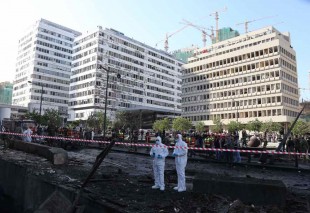

Bomb blast causes tourists to leave Lebanon hotels

The recent car bomb explosion in downtown Beirut which assassinated former Lebanese Finance Minister Mohammad Shatah has prompted tourists to cancel hotel room bookings for New Year’s Eve reports The Daily Star, Lebanon newspaper.
The Golden Tulip Serenada Hotel Hamra director of sales and marketing Mohammad Kanaan is reported to have said: “We lost around 15 percent of our New Year reservations within two hours after the explosion.”
Kanaan said most of the reservations were from Turkey, Egypt and Jordan.
“We had 80 percent reservations this morning, but following the explosion it dropped to 65 percent and we are definitely expecting more cancellations to take place in the coming few hours,” he added.
Shatah, a senior aide to former Prime Minister Saad Hariri, was killed along with at least five others in a car bombing in Downtown Beirut Friday morning.
Lebanon this year has been rocked by a series of bombings related to the ongoing conflict in neighbouring Syria that is weighing heavily on the Lebanese economy and its different sectors.
Hotels in many areas of Lebanon have already been suffering from low occupancy rates compared to previous years. Many of them have incurred heavy losses in 2013 and Friday’s bombing contributed to the further deterioration of the sector.
“My friends in travel agencies told me that they have already witnessed between a 30 and 40 percent drop in reservations to Lebanon for the coming festive season,” Kanaan said. “Groups of 60 and 70 persons in some hotels have already cancelled.”
Meanwhile, some of the tourists and visitors staying at Campbell Gray Hotel, located in Downtown Beirut, were seen packing their luggage and heading to the airport following the bomb attack.
“Some of our Qatari clients checked out today in addition to cancelling reservations for their families for New Year,” said Hilal Saade, the hotel’s director of Sales and Marketing.
Saade said that most cancellations usually take place 24 hours after any security problem. “This is the usual trend,” he said.
“We are expecting cancellations to take place because the location of the explosion is in the centre of Beirut, an area that is usually very attractive to tourists,” he said, adding that tourism activity usually gets affected when a security incident takes place in Tripoli or Beirut’s southern suburbs. “What if such an incident happens in the centre of Beirut?”
Saade said that prior to Christmas they issued a policy whereby tourists are obliged to pay for three nights even if they reserve for two nights only in order to encourage their clients to stay longer in the country. “However, we had to cancel this policy following the explosion today.”
The Four Seasons Hotel, which is also located in the Downtown area, reported that early departures were witnessed following the blast. The hotel’s sales and marketing director Roger Saad said cancellations Friday were very low but the picture would get clearer by Saturday.
Saad added that New Year’s reservations reached 90 percent, but he was not sure whether the hotel would be able to maintain that rate.
Other hotels such as the Phoenicia Intercontinental and the White House said they had not yet seen any cancellations. “We still did not see any cancellations but we are not getting any new reservations,” said Michel Mallat, Head of the Public Relations Department at Phoenicia Intercontinental.
For his part, Wissam Msharrafieh, manager of White House Suites, said that no cancellations had occurred so far but he was very worried because people usually reacted a day after the occurrence of any security incident. “Moreover, most of our clients are Iraqis who usually don’t care much because they are used to such issues.”